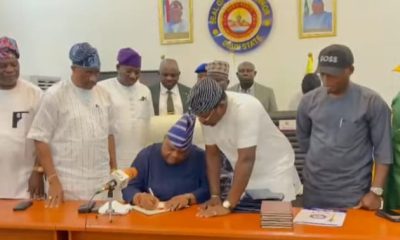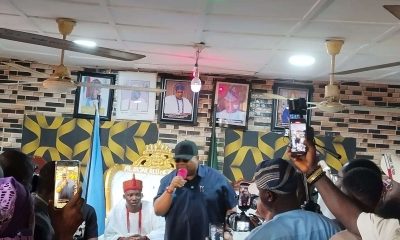Business
High crude price, falling naira distort FG’s economic plans

By AYOOLA OLAOLUWA
The continued depreciation of the naira and the rise in the price of crudel oil in the international have put spanners in President Bola Tinubu’s bold efforts at restructuring the nation’s floundering economy, Business Hallmark can report.
The president, among several other economic policies and belt-tightening measures, had scrapped the controversial fuel subsidy on May 29, 2023, his first day in office, while unifying all exchange rate windows adopted by his predecessors on Wednesday, June 14.
According to the president, the decisions were taken to save the country from going under.
“Removal of this once helpful device that had transformed into a millstone around the country’s neck had become inevitable.
“Also, the multiple exchange rate system that had been established became nothing but a highway of currency speculation. It diverted money that should have been used to create jobs, build factories and businesses for millions of people.
“Our national wealth was doled on favourable terms to a handful of people who have been made filthy rich simply by moving money from one hand to another. This too was extremely unfair’’, the president had told Nigerians in a national broadcast.
While it lasted, the subsidy regime had kept petrol prices cheap for Nigerians, but became increasingly costly for the country with the government spending $10 billion (N4trillion) in 2022, which pushed up budget deficits and escalated debts.
With the removal of subsidy, petrol prices have skyrocketed across the country, presently selling for between N580 and N650.
The development had negatively affected millions of households and businesses that depend on petrol powered vehicles for transportation and on petrol generators for electricity.
Reliable sources in government informed BH that the the present administration is in a dilemma over the rising prices of crude oil in the international market and the attendant spike in the pump price of petrol in the country.
According to the sources, the ever rising landing cost of petroleum products is giving the Tinubu administration a sleepless night.
“The government is currently in a difficult situation: to either reintroduce fuel subsidy or allow petrol to be sold as market forces dictate, and risk social uprising in the land”, a source in government told our correspondent.
BH checks at the weekend revealed that a barrel of Brent crude oil closed the day at $93.27 on Friday, September 22, after hitting a peak of $97 earlier in the week.
As a result, the pump prices of petroleum products are rising. For instance, prices for European low sulfur gasoline averaged $935 per metric ton in the international market on Friday.
By the time other operational costs of between $75 to $100 for brokerage fees and taxes are added, the average cost of petrol/PMT climbs to $1,035, about N774,000 at the official rate of N747.76 on Friday.
A quick conversion of the commodities from metric tonne to litres using the standard volume conversion rate showed that 1,341 litres of PMS will be gotten from a MT, with a litre going for $0.771 cents
A further conversion of the $0.771 cents per litre of PMS to naira indicate that the product will be about N580 per litre.
This amount only covers the cost of gasoline, as other fees like freight, insurance, NIMASA and NPA fees, storage, local transportation and marketers margins are not yet added.
Checks showed that a metric tonne of petrol had sold for $628 (N440,856 per metric tonne and N329) in May when the new administration swept to power; $694.8 (N500,256 PMT and N374 per litre) in June; $772 (N571,280 PMT and N427) in July; $989.75 (N737,550 PMT and N546 per litre) in August and $1,035 (N774,180 PMT and N577 per litre) in September 2023.
As stated earlier by BH, the quoted amounts are just for the cost of gasoline alone in the months under review.
According to available data from the Nigerian Shippers Council, fuel importers pay between $560,000 to $1million as freight (shipping) costs depending on the shipping companies and size of the vessels.
By the time the freight cost and the mandatory insurance premiums are added, another N70 to N100 is added to the landing cost of petrol.
Then, once the petrol arrives at the Atlas Cove Jetty in Apapa, Lagos, other fees on the old PPPRA price template, which BH learnt, is still largely in use, apart from the wholesale and retailers’ margins, which are now computed by oil marketers and retailers, are added.
The following fees on the PPPRA template are still applied on imported petroleum products: NIMASA charges; bridging fund; marine transport allowance; tax (0.5%); national transport allowance; depot throughput; local transport and Nigerian Midstream and Downstream Petroleum Regulatory Authority.
Other cost elements that make up the landing costs, which are largely under government control are lightening expenses; Nigerian Ports Authority charge, jetty throughput charge; storage cost; marine insurance; COQ and NOA; Q&Q analysis; Letter of Credit fees: interest rate fees and loading fees, all of which make up over 10% of the price of imported petrol.
By the time all these charges are applied, the pump price of petrol per litre as at Friday, September 22, 2023, comes to around N750 to N800.
However, the product is still being sold across the country for N620 on average, fueling reports that the Federal Government had surreptitiously reintroduced the fuel subsidy regime.
A national daily (not Business Hallmark), had last Thursday reported that the federal government had reintroduced fuel subsidy.
According to the newspaper which quoted a Federal Account Allocation Committee (FAAC) document, the Federal Government paid N169.4 billion subsidy in August. It claimed the Nigerian Liquefied Natural Gas paid $275million as dividends to Nigeria via NNPCL, which it alleged, used $220million (N169.4billion at N770/$) out of the $275million to pay for the PMS subsidy in August.
However, sources in NNPCL described the report as half truth. While confirming that the government subsidized petrol in the month of August as reported, they denied that the funds used for the subsidy was gotten from the NLNG dividends paid to the government.
“The report is not accurate. Yes, the government paid subsidy through ingenious means, but the NLNG dividends were not touched.
“What was done was simply financial engineering, nothing more. To crash the price of petrol, what government did was to waive some of the charges by some of its agencies.
“For example, I can tell you that the government had removed the fees on imported petroleum products charged by NIMASA and NMDPRA.
“Also, NNPCL, which has again become the sole importer of fuel since marketers are no longer importing, have been getting forex from the government to purchase the product at a subsidized rate.
“In essence, what was done to retain the old price of petrol, apart from giving NNPCL forex at a subsidized rate, is that the government removed some inefficiencies that contribute to the high cost of fuel.
“One of the inefficiencies include government, through the NNPCL, dealing directly with refiners, thereby removing the need to pay brokerages to agents.
“You can do your own calculation. The landing cost of petrol today, using government facilities and personnel (NNPCL), is around N600.
“So, by the time you add other costs, you’ll be talking in the region of N700 to N750 per litre. In other words, the government is only subsidizing petrol to the tune of about N100 and N150, contrary to frivolous figures been quoted in the media”, a source noted.
According to official government figures, the nation’s average daily petrol consumption crashed from a daily average of 66.9 million litres in January through May before the subsidy was removed, to 48.43 million litres (20 million litres) in June.
Sources in NMDPRA informed our correspondent that the figure further fell to about 40 million litres per day.
“In essence, the government only subsidised petrol to the tune of N6 billion (N180billion) in August if you use the current consumption figure of 40 million daily, and not the trillions been bandied about.
“How can your people (media) be using the parallel rate of over N900 to calculate the cost of refined fuel imported by the NNPCL?
“What they are implying is that the government through the NNPCL is also getting its forex from the black market. That is standing logic on its head.
“If you remove the difference between the official rate of about N774 and that of the black market, which is about N940, you have a difference of N166.
“Add N166 to N150 the government is actually spending on subsidy, you will get N316. That is the figure being thrown around as subsidy paid on a litre of petrol, which is quite far from correct”, another source in NMDPRA informed BH.
In their reaction, petrol marketers said that the pump price of petrol should be between N850 to N900 per litre based on the current price of crude oil in the international market, as well as the exchange rate of the naira against the dollar.
According to the National Public Relations Officer, Independent Petroleum Marketers Association of Nigeria (IPMAN), Chief Chinedu Ukadike, there is no way the federal government can sustain the price of petrol at N617/litre without paying subsidy on it, going by the continued fall of the naira.
“The dollar is almost N990 at the parallel market currently, and you can see the effect of this on the pump price of diesel. Diesel is close to N1,000/litre, so the retail price of PMS should be around N890 to N900/litre.
“Therefore, it is better the government assists the masses by paying subsidy”, Ukadike argued.
Another oil marketer, who did not want his identity disclosed, faulted government for selling forex to NNPCL at N740 per dollar, while marketers buy at over N900 per dollar in the parallel market.
“There is no way we can compete with the NNPC as long as the CBN continues to give it dollars at subsidized rates while we marketers buy at N920.
“As a result of this unfair treatment, our members have stopped importing fuel. We can’t just continue with the unfair arrangement”, he lamented.
Also speaking, a lecturer of behavioural psychology at the Olabisi Onabanjo University, Ogun State, Dr. Ropo Adejumo, warned government against imposing another price hike on the masses, noting that Nigerians are already stretched to the limit.
“Unleashing further hardship on them could result in a push back. So the government should be very careful in handling the matter.
“Using the harsh economic climate as an excuse, some elements have been whipping up sentiments against the government.
“This much was confirmed by the military high command recently, when it’s spokesperson alleged that some Nigerians were instigating members of the armed forces to move against the just installed civilian administration”, the university don advised.
However, IPMAN, President, Chinedu Okoronkwo, advised Nigerians to avoid speculations on the return of subsidies, saying it will further heat up the polity.
“The good thing is that NNPC is still importing and we are their major customers. So why should we be disturbing ourselves?
“I don’t want to be drawn into this needless discussion. Speculating will only throw the country into chaos. We believe the NNPC knows what to do, and they are doing exactly that”, he argued.







